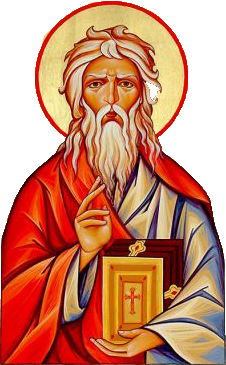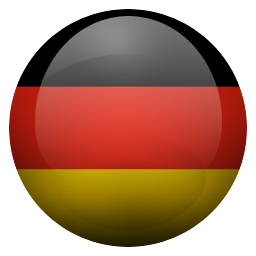
Patron

St. Andreas
Patron SaintThe Holy Apostle Andrew - the patron saint of the Bulgarian-German Social Association
The Holy Apostle Andrew, who was the first to be beckoned by Jesus Christ as His follower, was a blood brother of the Holy Apostle Peter, whom he brought to Christ (John 1:42). According to tradition, St. Andrew spread the Gospel of Christ in the regions around the Black Sea. He installed his companion, St. Amplias, as the first bishop of the town of Odessos, present day Varna. The Bulgarian-German Social Association chose the Holy Apostle Andrew Protocletos for its patron saint in order to place the combined social efforts of the Christians in the East and in the West under that love of Christ that connected the brothers, apostles Andrew and Peter, who, through their crucificial death, remained faithful to the Lord's commandments for love among all people (John 13:34). This is a message for brotherly mutual assistance, solidarity, and charity among all of us.
FROM THE LIVES OF THE SAINTS. Synodal Publishing House, Sofia, 1991:
30 November - St. Andrew Protocletosскрий
"The Holy Apostle Andrew is called Protocletos, or "First-called", because he was the first among the apostles to be called to follow Christ. Since his early age, he yearned for the divine truth, and when John the Baptist came to Judea, he became one of his disciples. Andrew was standing on the bank of the Jordan when John the Forerunner, pointing at Jesus, who was passing by, said, "Behold the Lamb of God!" (John 1:29). Upon hearing these words, Andrew followed the Saviour and spent the whole day with Him. After that, he went to find his brother Simon (Peter), and announced the good tidings: "We have found the Messiah" (John 1:41) and brought him to Jesus. The two brothers, however, continued their previous life, fishing for a living. They came from Bethsaida. Later, the Saviour saw them on the shore of the Sea of Galilee and told them: "Follow Me, and I will make you fishers of men" (Matthew 4:19). From then on, they followed the Saviour everywhere and witnessed His miracles, death, and resurrection.
Andrew's name is often met in the Gospels. He is mentioned in the narrative about feeding the people with 5 loaves (John 6:5-13). Andrew, with three other apostles, was asking the Lord about the future fate of the Temple and heard the prophecy of the destruction of Jerusalem and the end of the age (Mark. 13:3). He, together with Philip, told Jesus that some Greeks sought to see Him, and heard the words of the Saviour: "The hour has come for the Son of Man to be glorified" (John 12:22).
After the Ascension of Jesus Christ and the appearance of the Holy Spirit, when the apostles went to different lands to preach the word of the Lord, Andrew set off to the northern lands. Across Greece and Asia Minor and along our Black Sea shores, he reached the land populated by the Scythians. This land, wild and unknown back then, is present-day Russia. The apostle dedicated his whole life to preaching. He patiently endured persecution by pagans and won over new followers for Christ with his words, wonders, and exemplary life.
In the town of Sinope in Pontus, near the Black Sea, where St. Andrew arrived with the Holy Apostle Matthew, the two Christ's missionaries suffered terrible persecution by the Judeans, who had seen with malice that Christ's teachings was winning over many followers. The Judeans slandered the two apostles before the authorities, locked them in a dungeon, beat them and left them for dead and threw them out of the gates of the city. However, St. Andrew, healed by a miraculous appearance of the Saviour, returned to the town, continued preaching and converted many to Christ. As late as in the 7th century, people would still show the chair where the apostle used to preach and his marble icon.
St. Andrew preached diligently in the other towns in Pontus and Greece, healed the sick, banished evil spirits, convinced the newly converted to be kind to strangers and merciful to their slaves and to have love for everyone.
The Holy Apostles, scattered all over the world to spread the Gospel, would sometimes gather in Jerusalem for the holiday of Pascha. During these joyous meetings, they would inform each other of the success of their common mission; during the common prayers, they summoned new strength to continue their labour, and then would set off for their new travels. Together with St. John the Theologian, Apostle Andrew visited Ephesus, and then spent two years in Nicaea, where he performed many wonders and committed many former pagans unto Christ. The Holy Apostle's kindness and his virtuous life attracted the people, and whoever heard him would shout: "You are indeed a disciple and a friend of the kind and merciful God, and He does speak through your mouth!" The Holy Apostle travelled and preached in the towns of Heraclea, Chalcedon, and Trebisond; visited Armenia and Georgia. Legends of his stay in the latter country have been preserved up to the present day.
In his travels, the Holy Apostle Andrew reached into the mountains of Ossetia and Abkhazia, preached in Sebastia (present day Sokhumi), travelled along the coast of the Black Sea and visited Chersoneses Taurica (now the peninsula of Crimea). There were rich Greek colonies there at the time. At that time, however, little was known about the land that lied to the north. The tribes that populated it were known under the common name "Scythians". Nestor, the first Russian chronicler, tells a legend that had been preserved up to his time, that the apostle reached the place that nowadays is Kiev along the River Dnepr. Climbing upon a hill, he fixed a cross into the ground and told his disciples, who were accompanying him: "On this place God's grace shall shine, Christ's churches shall arise, and the true light shall come out from here to the whole land". Today, on the same hill is a church bearing the name of St. Andrew Protocletos.
After this difficult trip, St. Andrew visited Sinope and the towns that lied near the Black Sea. Also, he visited the city of Byzantion (now known as Istanbul) and installed Stachys, one of the 70 Christ's students, as the first bishop there. Going round the towns in Greece, St. Andrew, well-advanced in years already, came to the town of Patras, where his acts of heroism in this world were to end. Hearing the sermon of the gospels, many of the inhabitants of Patras renounced the idols and turned to the true God. Among them were the proconsul's wife, who was cured from a severe illness by the apostle, and the proconsul's brother, the philosopher Stratocles. At that time, the proconsul himself, Aegeates, was in Rome, where the cruel Nero reigned (54-68 AD).
After returning to Patras, Aegeates found out that the new teaching is rapidly spreading in the town and that it had even pervaded his family. Enraged, he started forcing the converts to offer sacrifices to the gods. St. Andrew bravely defended the Christians. He told Aegeates: "It beholds you, being a judge of men, to acknowledge the Supreme Judge, the true God!"
The proconsul started to blaspheme the Saviour and his teaching
- 'For this false teaching', he said, 'the Judeans nailed your teacher Jesus to the cross.'
- 'O, if you would recognise the mystery of the cross!', Andrew exclaimed. 'Not unwillingly, but willingly did our Saviour suffer on it, in order to redeem His people.
- 'I wonder', the proconsul said, 'how you can uphold a man who, no matter willingly or unwillingly, was crucified!'
Apostle Andrew started to praise the Lord and declared before Aegeates that he would gladly accept to die on the cross in the name of the Lord
- 'It is through foolishness that you praise the cross', Aegeates said, 'and through foolhardiness you are not afraid of death.'
- 'It is not through foolishness, but through faith that I am not afraid of death', Andrew replied.'
The proconsul insisted that Andrew bow to the pagan gods and offer sacrifices in their names, threatening him with crucificial death in case of disobedience. The Holy Apostle remained unbending, and Aegeates ordered that he be locked up in a dungeon.
Having heard of the imprisonment of their beloved teacher, the Christians, lamenting, gathered round the dungeon and wanted to see him, but the dungeon gates were locked. Andrew made the sign of the cross, and the gates opened before the Christians. They entered, and the holy apostle prayed and conversed with them. He asked for bread and wine and performed the sacrament of the Eucharist, administered the Holy Communion to everyone, and then ordained Stratocles bishop. The Christians were greatly agitated. They wanted to kill Aegeates and set Apostle Andrew free. However, he restrained them: "Do not stir up the peace of our Lord Jesus into devilish uproar! Do not try to prevent my martyrdom, but rather be prepared to endure hardships and ordeals yourselves, as good soldiers of Christ".
Apostle Andrew spent the night in prayer and conversation with the faithful. Then, he blessed everyone, bade them to adjourn, and locked up the prison gates again with the sign of the cross. On the next day, Aegeates again started trying to persuade Andrew to renounce the Lord. When Andrew refused, Aegeates had him cruelly beaten, and continued to threaten him with crucificial death at the same time.
- 'I am a slave of the cross of Christ', the apostle replied, 'I would rather pray to attain death on the cross than be afraid. I am more afflicted by your own destruction than my suffering.'
Disregarding Andrew's kind exhortations, Aegeates sentenced him to death on the cross. However, to prolong Andrew's suffering, Aegeates ordered that he be bound rather than nailed to the cross. While the saint was taken to his death, the people gathered around him and shouted: "What wrong has this righteous man, this friend of the Lord done, so that they are taking him to the crucifix?". But Andrew appeased the people and joyfully went to meet his death.
They bound him to the cross. Several thousand people flocked around him, resenting the judgment of the proconsul and shouting resoundingly: "For nothing is this man suffering!". And the apostle tried to appease the agitated multitude and continued to teach them in the word of God.
Aegeates, scared by the agitation, agreed with the desire of the people and went to the place of the punishment himself to order Andrew released from the cross. Upon seeing him, St. Andrew said: "Why have you come, Aegeates? If you wish to believe in Jesus Christ, the gates of heaven will open for you. If you have come to release me from the cross, know that I have no desire for this. I already see my King, I already worship Him, I already stand before him. But I pity you. Take care of your soul before it is too late!"
On behest by Aegeates, his servants started to unfasten the apostle from the cross. Then St. Andrew, raising his eyes to the sky, shouted: "Do not permit them, O Lord, to release me from the cross; do not bereave me from death similar to Thine! Accept me peacefully in Thy eternal Kingdom!" Having said this, the apostle passed away and his face shined with heavenly light.
The Christians buried the holy martyr. A few days later, Aegeates committed suicide. His widow and his brother visited the apostle's tomb until their death. They diligently served the Lord and helped the poor.
During the time of Emperor Constance (337 - 361 AD), the relics of St. Andrew Protocletos were moved to Constantinople and were placed in the church of the Holy Apostles. However, when the crusaders conquered Constantinople, they transferred them to the Italian town of Amalfi. This took place on 6 May 1208. They rest there up to the present day. And the honest head of St. Andrew Protocletos was in Rome. In 1964, it was transferred to the Patriarchate of Constantinople by the Roman Catholic Church as a sign of the restoration of the good relations between the two holy churches. The Holy Apostle Andrew is revered as an apostle of Orthodox Slavs, because he ordained the first bishop in Constantinople, the apostle Stachys, and from the Patriarchate of Constantinople, Orthodox Slavs - Bulgarian, Serbs, Russians, etc., received baptism and anointment.

Bank account in EUR
IBAN: BG06 PRCB 9230 1410175810
BIC: PRCB BGSF
Bank account in BGN
IBAN: BG83 PRCB 9230 1010175815
BIC: PRCB BGSF
In favor of:
ARE St. Andrew BGSNTS Varna
ARE St. Andrew BGSNTS Varna


